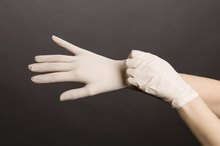What does fact checked mean?
At Healthfully, we strive to deliver objective content that is accurate and up-to-date. Our team periodically reviews articles in order to ensure content quality. The sources cited below consist of evidence from peer-reviewed journals, prominent medical organizations, academic associations, and government data.
The information contained on this site is for informational purposes only, and should not be used as a substitute for the advice of a professional health care provider. Please check with the appropriate physician regarding health questions and concerns. Although we strive to deliver accurate and up-to-date information, no guarantee to that effect is made.
How to Irrigate or Flush a Catheter
If you are caring for an individual with a catheter, you will likely need to irrigate, or flush it at some point. Catheters are used to drain the bladder when other means are not possible due to surgery, illness, incontinence, retention or certain other medical conditions that makes urination difficult. Catheters can become clogged, and do not drain well, when there are problems with an individual's urine, so irrigating the catheter may become necessary to help prevent further health problems.
If you are experiencing serious medical symptoms, seek emergency treatment immediately.
Open a catheter tip syringe packet. This should be new and sterile. Take 10 ml of irrigation solution into the syringe. Place the syringe back into the packaging, to keep the tip sterile until it is used.
How to Irrigate Foley Catheters
Learn More
Place a towel under the catheter 1. Clean the connection between the catheter and the drainage tubing with cotton balls and alcohol. Allow to them to dry.
Disconnect the catheter from the drainage tubing with a twist. Use a clean cap to cover the end of the tubing to keep it clean. Insert an empty syringe into the catheter, and pull back on it. If urine comes out of the bladder, empty the rest of the bladder gently.
How to Use Fleet Enemas Prior to a Prostate Biopsy
Learn More
Remove the syringe. Insert the syringe with irrigation solution into the catheter. Use the plunger to gently push the solution into the bladder. If this does not happen easily, pull back gently on the plunger to aspirate the bladder. If this does not work, call a doctor. Otherwise, after inserting the fluid into the bladder, withdraw it with the plunger.
Clean the connection between the tubing and the catheter with alcohol and cotton balls, and allow them to dry. Reconnect the catheter to the tubing 1.
Related Articles
References
- MedLine Plus: Urinary Catheters
- Håkansson MÅ. Reuse versus single-use catheters for intermittent catheterization: what is safe and preferred? Review of current status. Spinal Cord. 2014;52(7):511-6. doi:10.1038/sc.2014.79
- National Clinical Guideline Centre (UK), Royal College of Physicians (UK). Long term urinary catheters. In: Infection: prevention and control of healthcare-associated infections in primary and community care. London: National Clinical Guideline Centre, 2012.
- Willette PA, Coffield S. Current trends in the management of difficult urinary catheterizations. West J Emerg Med. 2012;13(6):472-8. doi:10.5811/westjem.2011.11.6810
- Cortese YJ, Wagner VE, Tierney M, Devine D, Fogarty A. Review of catheter-associated urinary tract infections and urinary tract models. J Healthc Eng. 2018;2018:2986742. doi:10.1155/2018/2986742
- Urinary catheter types and being part of the insertion team. Agency for Healthcare Research and Quality. Updated April 2017.
- Guide to implementing a program to reduce catheter-associated urinary tract infections in long-term care. Agency for Healthcare Research and Quality. Published March 2017.
- Urinary Catheters. Medline Plus. Updated January 6, 2020.
- Infection control: catheter-associated urinary tract infections. Summary of recommendations. Centers for Disease Control and Prevention. Updated November 5, 2015.
- Feneley RC, Hopley IB, Wells PN. Urinary catheters: history, current status, adverse events and research agenda [published correction appears in J Med Eng Technol. 2016;40(2):59]. J Med Eng Technol. 2015;39(8):459–470. doi:10.3109/03091902.2015.1085600
- Meddings J, Saint S, Fowler KE, et al. The Ann Arbor criteria for appropriate urinary catheter use in hospitalized medical patients: results obtained by using the RAND/UCLA appropriateness method. Ann Intern Med. 2015;162(9 Suppl):S1-34. doi:10.7326/M14-1304









